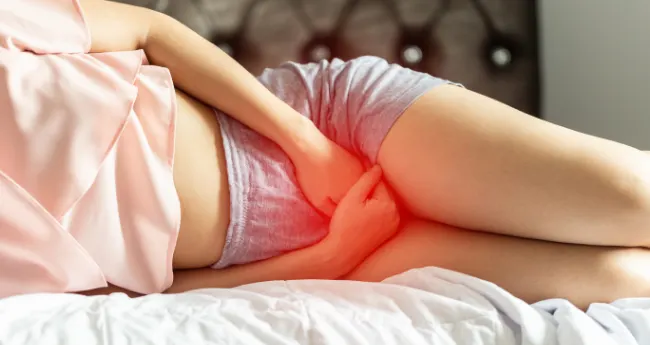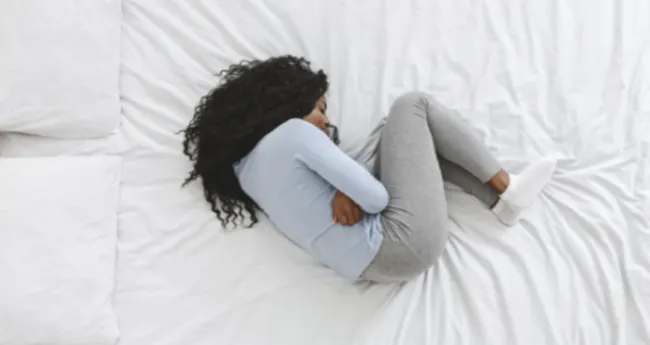Vaginal Ulcers: Common Causes and Treatment

A vaginal sore or ulcer is the term given to any bump or lesion that occurs anywhere around the female genitalia. It can appear on the vaginal or vulvar region and extend to the anal region.
It is possible for the bumps to appear without a significant cause and disappear after a while, on their own. However, vaginal sores can also be painful, tender, itchy and produce discharge.
Vaginal ulcers require proper medical attention, especially if you are facing symptoms like smelly discharge, itchiness, burning, bleeding, and pain when urinating. These can be caused due to external trauma or internal problems which we will be discussing in the next section.
What are the causes of vaginal ulcers?
The major causes of vaginal ulcers are internal infections, external trauma or compromised hygiene. Finding out the cause is the first step towards a solution. Following are some of the most prominent causes and what you can do to avoid or treat vaginal ulcers caused by them:
Yeast Infection
Yeast infection is the name given to fungal infections of the genital region. The most common symptoms of yeast infections are lesions, burning and itching. Although yeast infections are common, recurring infections need a different treatment. Recurring infections are yeast infections that happen 3-4 times a year.
Treatment
For a yeast infection, the doctor will prescribe antifungal medication that will usually clear up the infection within 3-7 days. Recurring yeast infections require different course of treatment and maintenance plans and your doctor will guide you through it.
Since yeast infections lead to thick, white discharge, using high quality panty liners can help create a moist-free environment around your private parts. The right pantyliner, like ALWAYS Multiform Protect Panty liners let’s your skin breathe and keeps it feeling fresh and dry for long hours. These pantyliners have a thickness of 1mm but offer quick absorption, letting you manage vaginal discharge in a discreet manner. Since vaginal discharge caused by yeast infection can alter the way your vagina smells, Always pantyliners help you feel comfortable and fresh.
Viral Infections
Viral infections can cause ulcers across female genitalia, including sores on vulva, sores on vag lip and ulcers on labia. Diseases like chickenpox, shingles, smallpox, etc. that cause sores across the body can also cause sores, lesions, redness and itching across the vaginal and vulvar region.
Treatment
The doctor will usually prescribe an antiviral medication, depending on the kind of viral infection that you are facing. The right treatment can help you manage the symptoms in a better way.
STD
Sexually transmitted diseases (STD) also cause vaginal sores. These can be a result of syphilis, herpes, chlamydia, and HIV infections. They can be accompanied by burning, pain during urination, lesions, etc. It is advisable to take the advice of a medical professional who will suggest the right treatment options for your condition.
Treatment
Vaginal ulcer treatment in the case of STIs or STDs in general is different. These types of sores require medical attention since HIV does enter the human body through genital wounds. It is important to forego intercourse when you treat female genital sores caused by STDs and advise your partner to also get tested, even if they are not showing any symptoms.
Ingrown Hairs
Ingrown hair can sometimes cause sores and turn painful. Ingrown hair is the hair that grow inside the skin rather than outwards, usually after a hair removal process. Since hair around the genitalia are coarser than anywhere else on the body, the sores caused by them also have the tendency to be more painful.
Treatment
You can use a warm compress to ease the pain. If you visit a doctor, he or she can also prescribe anti-inflammatory creams to soothe the area.
Trauma
External trauma to the skin can happen due to several reasons. Anything from scratching too hard to pubic lice and rough intercourse can cause vulvar ulcers and sores.

Treatment
Vaginal sore treatment for ulcers caused by allergies or external trauma like rough intercourse, hair removal, tight clothes, etc. have the tendency to go away on their own. You simply must avoid tight clothing, having intercourse, hair removal and anything that might worsen the situation till your sores heal.
Autoimmune Disorders
When your body’s immunity attacks parts of the body itself, it can cause your skin to react. When these reactions affect the genital regions, these can cause ulcers, lesions and sore.
Treatment
People with personal or family history of autoimmune disorders must take special care of their private parts even before vaginal sores appear. It is important to use products that do not cause irritation and stay away from anything that might inflame the area. It is advisable to visit the doctor as soon as a problem appears.
Cancer
Vulvar ulcers can also be a symptom of genital cancers. Vulvar cancers occur on the outer surface of the female genitalia and can manifest in the form of sores that sometimes itch. Other symptoms also include tenderness and pain, bleeding (other than menstruation) and changes in skin like colour change and skin thickening.
Treatment
Vulvar cancers need immediate medical attention and are usually treated through surgery. It ir recommended that you visit the doctor at the earliest if you notice any of the above-mentioned symptoms.
What are Vaginal Sores Complications?

You should get your vaginal ulcer treatment at the earliest. If left untreated, these can cause further complications. You can experience anything from mild fevers to life threatening complications like deadly infections. These complications can look different for different people.
You can expect scarring, which is permanent in some cases, discoloration of the skin, reduced elasticity, pain and more. If you are facing ulcers as a result of STIs, you must seek treatment immediately since these can be symptoms of an underlying disease.
Vaginal Sores Prevention

As they say, prevention is better than cure. You can prevent most of the causes of vaginal sores like yeast infections and STIs by taking precautions like using contraceptives, wearing comfortable clothing, keeping the genital area clean and dry and using superior sanitary products like ALWAYS sanitary pads, panty liners and tampons.
The ALWAYS Ultra Thin sanitary pads feature a super absorbent core with the InstantDry System so you don’t have to worry about moisture building up. These feature flexible wings which adjust according to your body movements, giving a secure yet comfortable fit. Always Ultra Thin pads are designed with supreme quality material for maximum safety and up to 100% comfortable protection.
If you are someone who prefers using tampons, then you can make ALWAYS Tampax Compak tampons your preferred choice. These are super absorbent and offer total discretion. The anti-slip applicator ensures a smooth and comfortable insertion and the Innovative Absorbent Core keeps the liquid locked in, giving you a comfortable, dry fit.
Takeaway
Vaginal sores and ulcers can be caused by a multitude of reasons. While some of them go away on their own, there are some causes that need to get proper medical attention. It is important to consult your doctor to get the right diagnosis and medical guidance if your symptoms persist or if you have a medical history that can put you at risk.
Exploring the benefits of vaginal steaming? Discover what the research says before trying it yourself.
FAQS
1. What causes sores on your private parts?
Vaginal sore or vulvar sores can be caused by a whole range of reasons. You can get them from:
- Wrong hair removal methods/products
- Rough intercourse
- Yeast infections
- STDs
- Autoimmune response
- Cancer
It is recommended that you go visit the doctor if the symptoms persist or get worse.
2. What does sores on your vag mean?
Vaginal sores can mean that your body is facing a yeast infection, a viral infection, an STI or it can be an autoimmune response. They can also be caused due to physical trauma like excessive scratching, pubic lice, intercourse, wrong hair removal methods, etc.
3. How do you cure a vulvar ulcer?
Vulvar ulcers sometimes go away on their own if they have been caused by external trauma like intercourse, hair removal, etc. Other times, the doctor might prescribe oral medicine, creams, ointments, and the likes. Depending on the severity of your condition
Disclaimer:
Please note the date of the last review or update on all articles. No content on this site, regardless of date, should ever be used as a substitute for direct medical advice, diagnosis or treatment from your doctor or other qualified clinician. Always is committed to ensuring that all of our products meet rigorous safety standards; Always pads prioritize safety, protection and comfort of its consumers.




